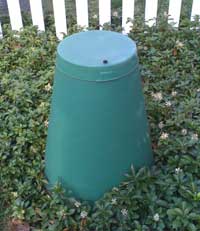Lessons From My Garden
 By Nancy Grundahl
By Nancy Grundahl
The recent Philadelphia Flower Show inspired me. I bought 3 kinds of asparagus roots and seed packets for those sweet, round yellow watermelons that are hard to find, corn and green beans. Already in my garden are blueberry bushes and a sour cherry tree. I have found that growing my own food is fun, relaxing and educational. Here are some of the lessons my garden has taught me.
Conditions need to be right or your seeds won’t grow and your plants won’t thrive. If a plant needs to be in the sun, plant it in a sunny area. If a plant needs moist soil, keep it moist or it and you will not be happy.
Create a healthy garden environment and wildlife will come. Birds love berries, even when they are not ripe. Bunnies love small tender plants. Deer? If they are in your area they will probably find you, as will slugs and beetles and on and on. It means your garden is healthy and inviting.
Nothing tastes like fruit and vegetables you grow yourself. They are typically way better than what you can find in stores. Ah, there’s nothing like eating a warm tomato that you just picked! Plus, you can plant unusual varieties, like heirlooms, to experience tastes you didn’t know exist. Biodiversity is a very good and yummy thing.
Using water you’ve captured (like in a rain barrel) is a better way to water your plants, particularly if your tap water is chlorinated. You might even just run a hose from a downspout into your garden. And, capturing stormwater can help reduce flooding from run-off. And, you’ll save money!
Mosquitoes love to breed in standing water, so don’t have any. Turn buckets upside down. Getting attacked by mosquitoes while you are gardening is very annoying and they can spread disease.
Weeds almost always grow better and faster than planted plants. That’s why they’re called weeds.
Native plants grow better than non-natives. That is unless you are unlucky enough to have a non-native plant that’s invasive, like kudzu. Natives can be hard to find, but search them out — they are worth it.
Don’t trash your yard waste; turn it into compost instead. Recycle! Reuse! Your plants will grow better with compost.
Yes, I’m ready to get going outside in this earlier-than-normal spring in the Northeast.
About the author: Nancy Grundahl has worked for the Philadelphia office of EPA since the mid-80’s. She currently works in Program Support for the Water Protection Division. Nancy believes in looking at environmental problems in a holistic, multi-media way and is a strong advocate of preventing pollution instead of dealing with it after it has been created.

Mar 30, 2012 @ 10:53:39
Nancy,
Great tips. Thanks,
Lina
Mar 30, 2012 @ 11:05:52
How Creates Our Forests Like as Your Garden On ?
Dear Mrs. Grundahl,
Nice article ! As an experience environmentalist, could you write an article about damage of the forests in the earth? You have the steps of how’s arrange the plants, so you are fitting should create our forests like as you did. I am frustrating with the several its damaged, because our leaders are busy with their crony business, not public opinion…. Thank you!
Mar 30, 2012 @ 13:51:11
I CRUSADED FOR AN URBAN FOR GARDEN POLICY IN MY CITY OF UPLAND, CALIF. THE POWERS THAT BE OKed A CITY CODE ALLOWING ALL HOMEOWNERS TO USE THE CITY PARKWAY TO GROW FOOD. THIS IS WISE FOR SERVERAL REASONS. IT SAVES WATER AND THUS ENERGY OVER TRADITIONAL GRASS AND THE FOOD MILES ARE LESS. ALSO THERE IS RESERVE FOOD IN CASE OF A CALIF. EARTHQUAKE;AND THE FOOD GARDEN DOES NOT NEED TO BE MOWED USING GAS OR ELECTRICITY GENERATED BY COAL. ALSO THE ECO-PSYCHOLOGY POSITIVES ARE GREAT. THE NEIGHBOR KIDS NOW KNOW WHERE THEIR FOOD IS GROWN IN AN ORGANIC ENVIRONMENT; AND THIS PRODUCES ECO-FRIENDLY ADULTS LIKE ME AS I GREW UP ON A POTATO FARM IN SOUTH ONTARIO, CALIF. NANCY YOU ARE THE FUTURE INDEED. THANKS. DR. KAMANSKY, FORMER CAPTAIN, US ARMY PS THE ARMED FORCES ARE NOW GOING ECO-FRIENDLY ON MANY ARMY BASES
Apr 03, 2012 @ 10:58:33
Are you familiar with edible forest gardens? I think that’s such a wonderful concept — reproducing a forest habitat using plants that provide food for humans. You can find more information at: http://www.edibleforestgardens.com/about_gardening.
Mar 30, 2012 @ 14:04:59
Nancy you are spot on about bio diversity and experiencing unique tastes. I love to experience the new varieties of fruits and vegetables I enjoy from my hydroponic gardens
Mar 30, 2012 @ 18:40:16
Dear Mrs. Grundahl
NICE REPORT
I HAVE A PROJECT TO RUN AY 1/3 FUEL OF ALL IC/EC ENGINE IN TRANSPORT, POWER PLANT
CER 15 BNT/Yr INV 700 BN$ PROFIT 2800 BN$/Yr
CER 15 MNT/Yr INV 700 MN$ PROFIT 2800 MN$/Yr
Aug 10, 2013 @ 09:04:12
Are weeds helpful to the environment or harmful? On balance are weeds in every crack in a polluted city neighborhood helping air quality by giving oxygen and trapping co2 and pollution? Should all the weeds in every conceivable corner be pulled, or do they help with urban storm water runoff? Don’t weeds have a bad rap? After all they are the ultimate survivors and these survivor qualities could be studied, captured genetically, and transferred to useful plants. Should I thank a weed or weed-trees when I see them, or think of them as enemies and pull them up?